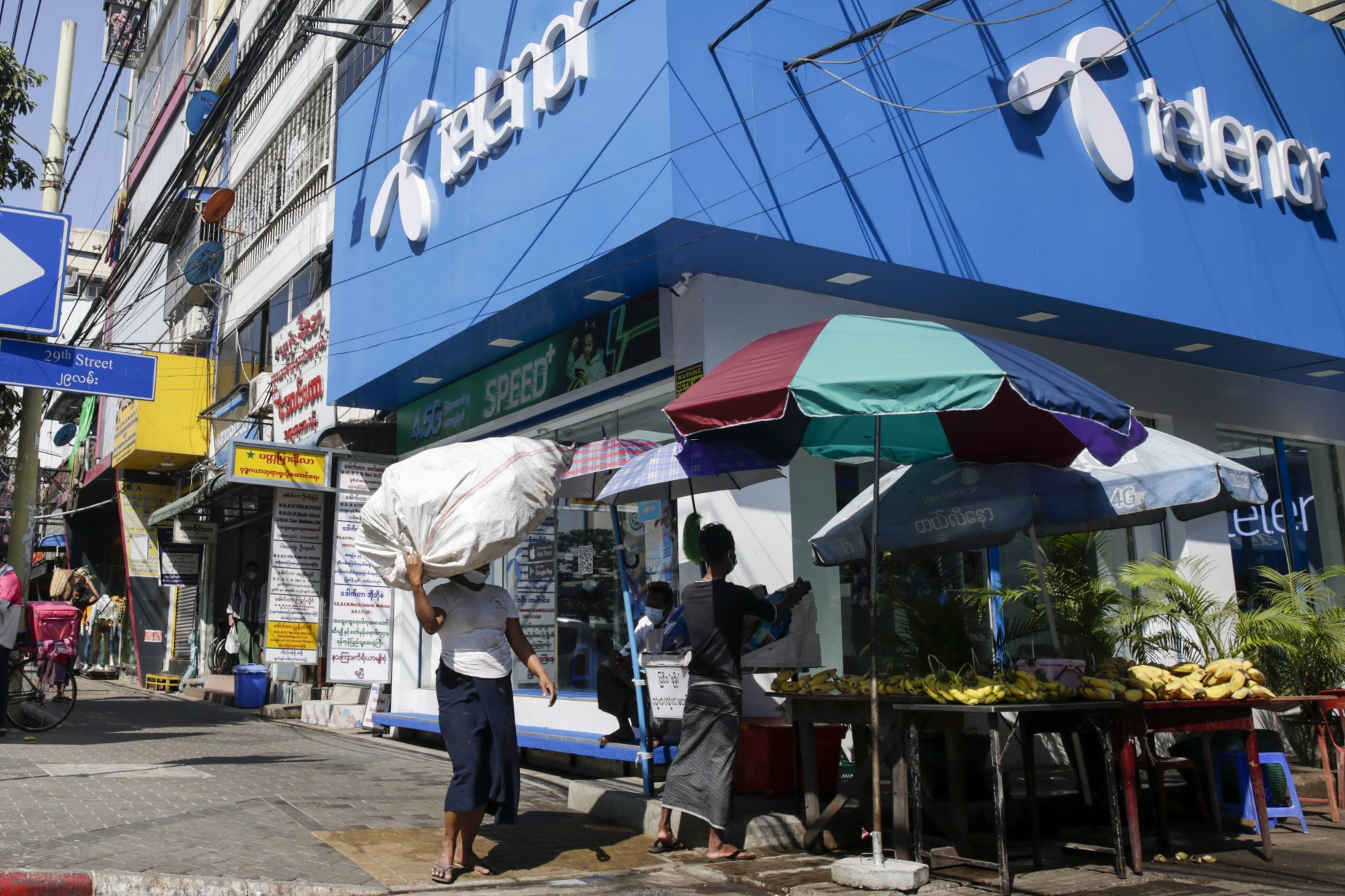
The Myanmar military gave regulatory approval to the sale of Norwegian telecom giant Telenor Group’s Myanmar operation to Lebanon’s M1 Group on Thursday after months of stalling the process.
Telenor announced the sale of its Myanmar subsidiary to M1 Group in early July last year following the deteriorating situation in the wake of the military coup in February. M1 Group has been criticised for working with despotic regimes worldwide.
The Myanmar military initially blocked the sale when M1 was the sole buyer, but the Lebanese company agreed to transfer a controlling stake in the venture to a Myanmar firm called Shwe Byain Phyu, which has strong ties to the military.
Telenor spokesperson Cathrine Stang Lund told Myanmar Now on Thursday that the company “has received and is currently assessing” a letter from the Post and Telecommunications Department (PTD) under the junta’s Ministry of Transport and Communications regarding the regulatory approval process.
“It is important to note that a PTD approval is only one step in the total approval process and we are still awaiting final regulatory approval for the transaction between Telenor and M1 Group,” she said.
Myanmar Now understands that after this approval from PTD, Telenor will submit an application to the Myanmar Investment Commission on Friday to complete the paperwork for the transfer of shares to M1 Group.
Leaked documents show that the final owner of Telenor Myanmar will be Investcom Myanmar, a joint venture between M1 and Shwe Byain Phyu. The Myanmar company will own a majority stake in the new partnership.
During an interview with Myanmar Now earlier this week, Shwe Byain Phyu’s chair Thein Win Zaw did not deny his company’s partnership with M1, but declined to discuss the details, citing “pending issues.”
Telenor, which is majority-owned by the Norwegian government, has come under fire from international rights groups that say it has not done enough to protect the personal data of its more than 18 million Myanmar customers—data that is at risk of exposure to the junta through the sale of its Myanmar unit to military-linked entities.
The sensitive subscriber data includes the times, dates and locations of calls and text messages—information that could potentially be used by the military to target its political opponents.
In early February, Telenor Myanmar employees sent a letter calling on the chair of Telenor’s board of directors, Gunn Wærsted, to “immediately intervene to terminate the sale”. The letter accused the company of a “lack of transparency with employees” regarding the sale.
A Telenor Myanmar staff member who has been working with the company for three years estimated that at least 50 of its several hundred employees sent the letter.
“I can’t ignore the fact that it will create risks to the security of all [Telenor customers] in the country,” said the staff member, explaining why he decided to join the internal campaign against the sale.
“They gave the security of employees as a justification… But I believe that there are surely other ways that would not affect the security of the employees and wouldn’t expose the data of the people,” he said, speaking to Myanmar Now on condition of anonymity.
A Telenor spokesperson in Norway told trade journal Inside Telecom that the company’s headquarters had received “several” emails from Myanmar employees, but refused to reveal how many.
According to the publication, Telenor also said that some of its employees had “reacted” to the sale during the company’s meetings.
“[Telenor said] that it is a good thing the employees are open-hearted and express their views, and that the arguments presented illustrate the demanding dilemma Telenor is facing in Myanmar,” Inside Telecom shared with Myanmar Now.
Legal experts and human rights activists have also urged Telenor to protect the metadata of its customers, either by putting the sale on hold or by deleting the data before the sale.
In response to these calls, Jørgen C. Arentz Rostrup, Telenor’s executive vice president and head of its Asia operations, said last Friday that there were “no good alternatives” to the sale of its Myanmar operation amid mounting security issues faced by the company following the coup.
Rostrup insisted that after considering potential alternatives to the sale, including actions recommended by industry stakeholders and activists, Telenor had decided that selling the business would be the “least detrimental solution” for its customers, employees and Myanmar society.
He also ruled out simply shutting down the Myanmar unit and deleting customer data. Doing so would put the company’s employees at considerable risk, he said, citing Myanmar laws that require local telecom operators to store user data for a period of five years.
The Myanmar junta last year barred Telenor executives from leaving the country while the regulatory process with the military authorities was still ongoing, Rostrup explained.
Rostrup added that last year’s military takeover had left Telenor with no choice but to exit Myanmar and sell its operations after the junta instructed all telecom companies in the country to install intercept equipment. Telenor maintains that it has not complied with this demand.
Amid calls for the halt of the sale, a Norwegian civil society network also submitted a complaint against Telenor Group’s leadership with police on February 11, urging a probe into whether the planned sale of its Myanmar subsidiary was in violation of Norway’s laws on “crimes against humanity.”
Correction: A spokesperson for Telenor was erroneously quoted in the first paragraph of the original story.



